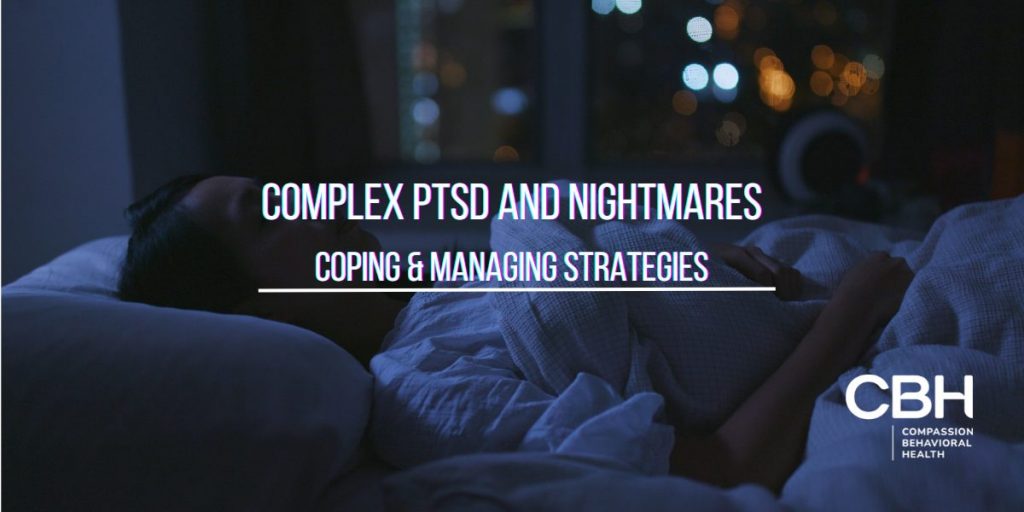Managing Complex PTSD and Nightmares can be a challenging and overwhelming journey, but with the right understanding and coping mechanisms, it is possible to find relief and regain control over your life. This article aims to provide insights into Complex PTSD, its connection with nightmares, and various treatment options and self-care strategies to manage the condition effectively.
Understanding Complex PTSD

Complex PTSD, also known as C-PTSD, is a psychological disorder that develops after experiencing repeated and prolonged traumatic events. Unlike traditional Post-Traumatic Stress Disorder (PTSD), which typically arises from a single traumatic incident, C-PTSD is characterized by long-term exposure to trauma, such as ongoing physical or emotional abuse, captivity, or childhood neglect.
Living with Complex PTSD can be incredibly challenging, as the effects of prolonged trauma can deeply impact an individual’s daily life. It is important to recognize and understand the unique experiences and symptoms associated with this disorder.
The Connection Between PTSD and Nightmares

Nightmares are a common symptom experienced by individuals with PTSD, including those with Complex PTSD. The connection between PTSD and nightmares is complex and rooted in the effects of trauma on the brain’s functioning and the subsequent impact on sleep patterns.
The Role of Trauma in Dreams
Traumatic experiences can profoundly affect our dreams. Nightmares related to PTSD often involve re-experiencing aspects of the trauma, which can be distressing. These nightmares may serve as a way for the mind to process and attempt to make sense of the traumatic events.
When a person experiences a traumatic event, the brain’s response mechanisms are activated. These mechanisms are designed to help us survive dangerous situations by releasing stress hormones and preparing the body for fight or flight. However, in the case of PTSD, these mechanisms can become dysregulated, leading to an overactive stress response even in non-threatening situations.

During sleep, the brain continues to process information and emotions from the day. For individuals with PTSD, this processing can manifest in the form of nightmares. The brain tries to make sense of the traumatic memories, replaying them in dreams as a way to process and integrate the experience. This can be a distressing and exhausting process for those affected.
How PTSD Influences Sleep Patterns
PTSD can disrupt normal sleep patterns and contribute to the occurrence of nightmares. Sleep disturbances can include difficulty falling asleep, frequent awakenings, and nightmares that disrupt sleep continuity. These sleep disruptions further exacerbate the symptoms of PTSD, creating a cycle of distress.
One of the key factors contributing to sleep disturbances in individuals with PTSD is hyperarousal. Hyperarousal is a state of heightened alertness and increased physiological arousal, which can make it difficult to relax and fall asleep. This hyperarousal is often a result of the constant vigilance and hypervigilance that individuals with PTSD experience, as they are constantly on guard for potential threats.
In addition to hyperarousal, individuals with PTSD may also experience intrusive thoughts and flashbacks, which can disrupt sleep. These intrusive thoughts and flashbacks can occur during both wakefulness and sleep, leading to nightmares and night sweats. The fear and anxiety associated with these symptoms can further contribute to sleep disturbances and the development of chronic insomnia.
Furthermore, the impact of PTSD on sleep patterns extends beyond nightmares. Sleep quality is often compromised in individuals with PTSD, with many reporting fragmented and restless sleep. This can lead to feelings of fatigue and daytime sleepiness, further impairing daily functioning and overall well-being.

It is important to note that the relationship between PTSD and nightmares is not a one-size-fits-all scenario. While nightmares are a common symptom, not everyone with PTSD will experience them. The severity and frequency of nightmares can vary from person to person, depending on individual factors such as the nature of the trauma, personal resilience, and available support systems.
Addressing the connection between PTSD and nightmares requires a comprehensive approach that includes PTSD therapy, medication, and lifestyle changes. Therapeutic interventions such as cognitive-behavioral therapy (CBT) and eye movement desensitization and reprocessing (EMDR) have shown promise in reducing nightmares and improving overall sleep quality in individuals with PTSD.
The connection between PTSD and nightmares is multifaceted and influenced by various factors. Understanding the role of trauma in dreams and the impact of PTSD on sleep patterns can help guide effective treatment strategies for individuals struggling with these symptoms.
Coping Mechanisms for Nightmares
Coping with nightmares is crucial for managing the impact of Complex PTSD. Several techniques can help reduce nightmare frequency and improve the overall quality of sleep.
Techniques for Reducing Nightmare Frequency
There are various techniques that individuals with Complex PTSD can employ to reduce the frequency and intensity of nightmares. These may include practicing good sleep hygiene, creating a safe and calming sleep environment, using relaxation techniques before bedtime, and engaging in regular physical exercise.
The Role of Therapy in Nightmare Management

Therapy plays a vital role in managing nightmares and addressing the underlying causes of Complex PTSD. Evidence-based therapies, such as Eye Movement Desensitization and Reprocessing (EMDR) and Cognitive-Behavioral Therapy for PTSD (CBT-PTSD), can help individuals process traumatic experiences, reduce nightmares, and improve overall well-being.
Treatment Options for Complex PTSD
Seeking professional help is crucial when managing Complex PTSD. There are various treatment options available that can assist individuals in managing their symptoms and reclaiming their lives.
Psychotherapy and Complex PTSD
Psychotherapy is considered the cornerstone of treatment for Complex PTSD. Therapists specializing in trauma-focused approaches, such as Trauma-Focused Cognitive-Behavioral Therapy (TF-CBT) and Dialectical Behavior Therapy (DBT), can help individuals develop coping strategies, improve emotional regulation, and work through the effects of trauma on their daily lives.
Medication Options for Complex PTSD
Medication may be prescribed as part of a comprehensive treatment plan for Complex PTSD. Antidepressant medications, such as selective serotonin reuptake inhibitors (SSRIs), can help manage symptoms of depression, anxiety, and intrusive thoughts commonly associated with the disorder. However, medication should always be used in conjunction with therapy and under the guidance of a qualified healthcare professional.
Self-Care Strategies for Managing Complex PTSD
Engaging in self-care activities can be empowering for individuals managing Complex PTSD. These strategies can assist in cultivating resilience, promoting healing, and reducing the impact of symptoms.
Importance of Routine in Managing PTSD

Establishing a daily routine can provide a sense of stability and control, which is crucial for individuals with Complex PTSD. Creating a structured schedule that includes regular sleep patterns, healthy meals, exercise, and relaxation can help regulate emotions and minimize triggers.
Mindfulness and Relaxation Techniques
Mindfulness and relaxation techniques, such as deep breathing exercises, meditation, and guided imagery, can be beneficial in managing stress and promoting emotional well-being. These practices help individuals remain present and grounded, allowing them to cope more effectively with intrusive thoughts and emotions.
In conclusion, effectively managing Complex PTSD and nightmares requires a comprehensive approach that addresses the unique challenges and symptoms associated with this condition. Through understanding the nature of Complex PTSD, recognizing the connection between PTSD and nightmares, and accessing appropriate treatment options and self-care strategies, individuals can take significant steps towards healing and reclaiming their lives.
Evidence-Based Complex PTSD Treatments at CBH

At Compassion Behavioral Health, we recognize the intricate challenges of handling Complex PTSD and its related symptoms. Our devoted team is passionate about offering tailored care and assistance for every individual, emphasizing that no one walks the path to healing alone. With the correct resources, expertise, and backing, navigating the hurdles of Complex PTSD becomes achievable. Call us today to get a free assessment.



